Shaba National Reserve
Shaba National Reserve, a renowned safari destination, is situated just north of the frontier town of Isiolo in Kenya’s hot and arid northern region. Located in Isiolo County, east of the Samburu and Buffalo Springs national reserves and along the banks of the Ewaso Ng’iro River, Shaba spans an area of 239 sq km.
The reserve lies 320 km northeast of Nairobi and only 8 kilometers north of Archers Post, a Samburu County settlement home to the Samburu people. Its altitude ranges between 700 to 1,500 meters above sea level.
Shaba National Reserve, together with the Samburu National Reserve and Buffalo Springs National Reserve, forms an ecological unit. The three nature reserves are not separated by fences and the wild animals are free to wander from one reserve to the next. The Shaba National Reserve is one of the less visited areas in Kenya and is located off the main tourism paths. It is one of the most northerly parks in the country and here you will experience the fascinating landscapes north of Mount Kenya in absolute seclusion.
Covering an area of 239 sq km, Shaba’s scenery is stark and beautiful, dominated by Shaba Hill in its southern section and surrounded by steep ravines, a favorite haunt for leopards. There are also good views of the Sugarloaf Mountain of Ol Ololokwe north of Archer’s Post.
Bisected by the Ewaso Nyiro River, the reserve features tracts of riverine forest with ragged doum palms and grasslands interspersed with lava outcrops, numerous springs, and marsh areas leading into the Lorian Swamp.
How do I get to Shaba National Reserve?
By Road: Shaba National Reserve is 320km/198 mi north of Nairobi and the drive takes 5 to 6 hours. The reserve is much closer to other northern parks, which are worth combining with a visit here, including the Laikipia conservancies such as Ol Pejeta Conservancy, Lewa Wildlife Conservancy, and Meru National Park.
By Air: Domestic and charter flights from Nairobi leave from Wilson Airport to Kalama Airstrip or Buffalo Springs Airstrip which are 15km and 30 km respectively from Shaba National Reserve. Flights take approximately 45 minutes from Nairobi to either airstrip.
What is the best time to visit Shaba National Reserve?
Shaba National Reserve can be visited year-round, but wildlife watching is usually best in the dry months from June to September and again from January to February. It is wise to avoid the peaks of the Wet season in November and April. During these months, wildlife (which has spread out anyway due to water availability) is more challenging to spot in the long grass.
What kind of animals can be seen in Shaba National Reserve?
In this dry landscape, the Ewasa Ngiro River is an important lifeline for many plants and animals. The animals living here have adapted to the arid climate and have developed their unique characteristics.
Among the animals you will see in Kenya’s northern and arid regions are the Somali giraffe, the oryx antelope with its long and powerful horns, and the Somali ostrich. Grevy’s zebras, with their significantly thinner stripes and larger ears than their counterparts in the south, and gerenuks, also called giraffe antelopes due to their long necks, have also made this arid zone their home. Elephants, buffaloes, lions, cheetahs, and leopards can also be found, especially along the riverbanks.
What activities can be done in Shaba National Reserve?
✓ Climbing: Exploring Shaba’s volcanic terrain through climbing, offering both easy and challenging routes with panoramic views from elevated points.
✓ Crocodile Watching: Observing crocodiles along the Ewaso Ng’iro River at strategic viewpoints, where guides share insights into their behavior and biology.
✓ Camel Safaris: A peaceful journey through the reserve on camels, allowing for close wildlife observation and access to remote areas, guided by local experts.
✓ Traditional Samburu Village Visits: A cultural experience with the Samburu people, where visitors learn about their traditions, livestock herding, and beadwork.
✓ Nature Walks: A guided exploration of Shaba National Reserve’s semi-arid landscape, offering close encounters with the flora, fauna, and scenic volcanic terrain.
✓ Game Drives: Wildlife drives through the reserve, home to animals like lions, elephants, and Grevy’s zebras, with the best sightings during morning and evening hours.
What are the accommodation options in Shaba National Reserve?
The only accommodation option in Shaba National Reserve is Sarova Shaba Game Lodge, a 4-star lodge located along the Ewaso Nyiro River. It offers 80 standard rooms, 4 executive suites, and 1 presidential suite, all equipped with modern amenities like mosquito nets, minibars, and private balconies.
The lodge is known for its serene environment and proximity to nature, providing a unique safari experience. Meals are served at the Surpelei Restaurant, which offers panoramic views and a variety of international cuisines.
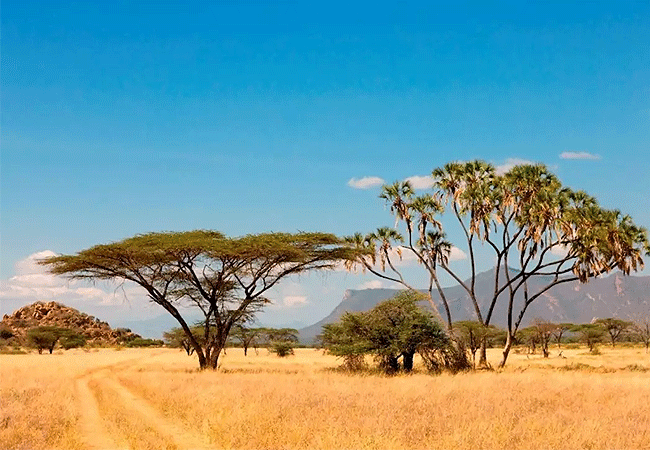
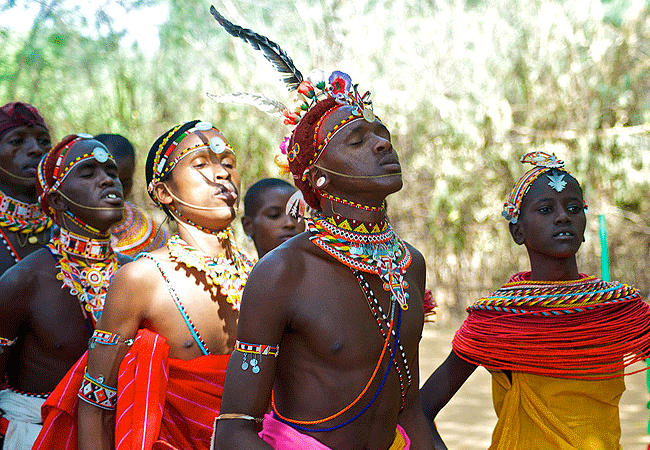
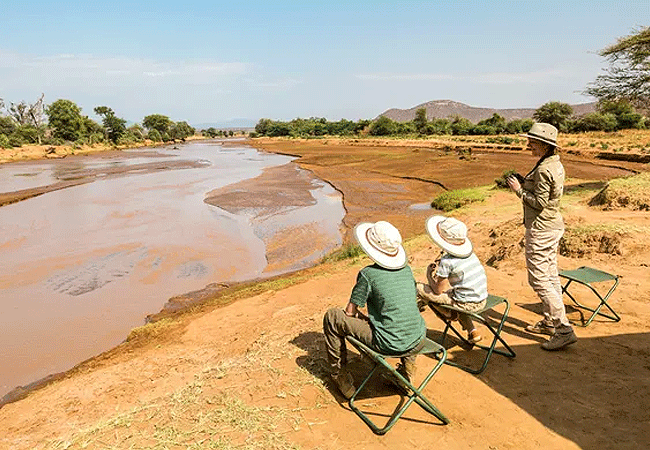
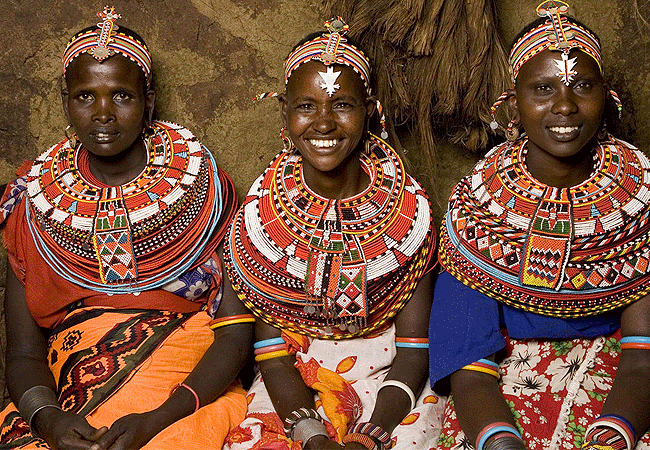
Shaba National Reserve Wildlife | Animals & Birds
Shaba National Reserve hosts a wide variety of wildlife, shaped by the challenging, dry conditions of its environment. Elephants are frequently encountered, with large herds often spotted as they search for water and food. These giants are particularly visible near the Ewaso Ng’iro River, either crossing it or returning at dusk to bathe. The reserve’s shifting landscape offers ever-changing opportunities to observe wildlife, as animals constantly move in response to the availability of water.
Shaba is home to numerous predators, including lions, leopards, cheetahs, spotted and striped hyenas, bat-eared foxes, and common genets. One of the reserve’s special highlights is its population of endangered wild dogs, a rare sight even among nearby reserves. This abundance of predators underscores the richness of the ecosystem, where these carnivores thrive alongside their prey.
The reserve’s arid shrublands shelter unique species like the Grevy’s zebra, distinguished by its large, rounded ears, unlike the more common Burchell’s zebra. The rare reticulated giraffe and Beisa oryx also inhabit the area, along with elands, impalas, Bright’s gazelles, and gerenuks. Smaller but equally intriguing species such as warthogs, Kirk’s and Guenther’s dik-diks, and both lesser and greater kudus are well adapted to the tough, thorny terrain.
The 32-kilometer Ewaso Ng’iro River is the lifeblood of this arid landscape, meandering through the reserve with its brown, muddy waters. Hippos thrive in the river, while massive Nile crocodiles can be found basking on its sandbanks, camouflaged, and lying in wait. Impalas, waterbucks, and buffaloes are commonly seen near the river, finding refuge in the thick vegetation along its banks.
Shaba boasts a spectacular array of birdlife, with over 100 species visible in a single day. The rare blue-shanked Somali ostrich is a notable sight, while the coral-rumped white-headed buffalo weaver adds vivid flashes of color.
Secretary birds are abundant, as are helmeted and vulturine guinea fowl, saddle-billed storks, and red-billed hornbills. The reserve is also one of the few places where the elusive William’s lark can be spotted.
Shaba’s rugged cliffs and towering inselbergs make it an ideal habitat for raptors. From the diminutive pygmy falcon to the powerful martial eagle, these birds of prey are a prominent feature of the landscape. Verreaux’s eagle owls also patrol the riverbanks, enhancing Shaba’s reputation as a prime destination for bird enthusiasts, particularly those interested in raptors.
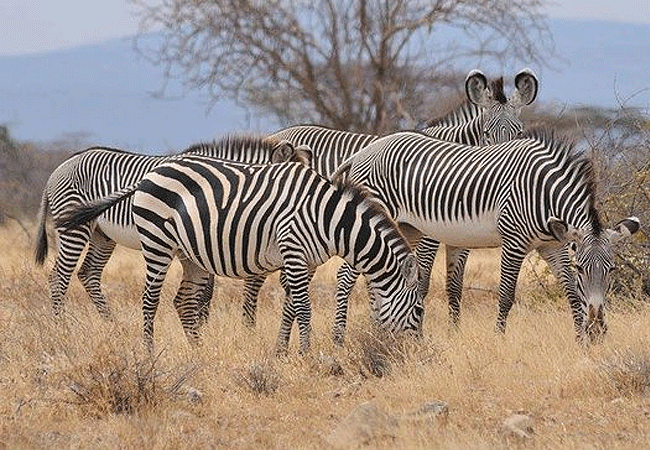
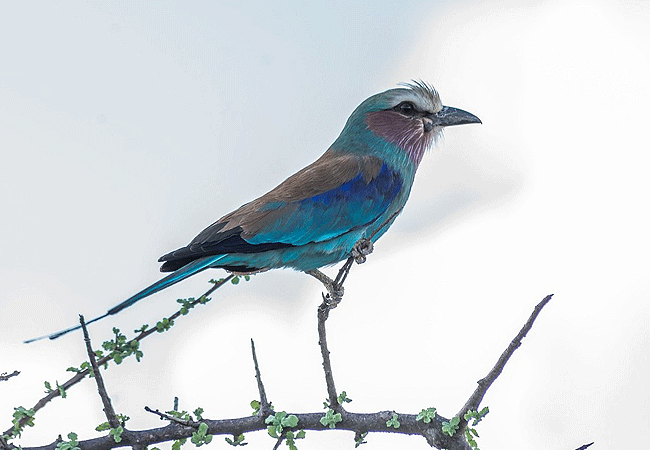
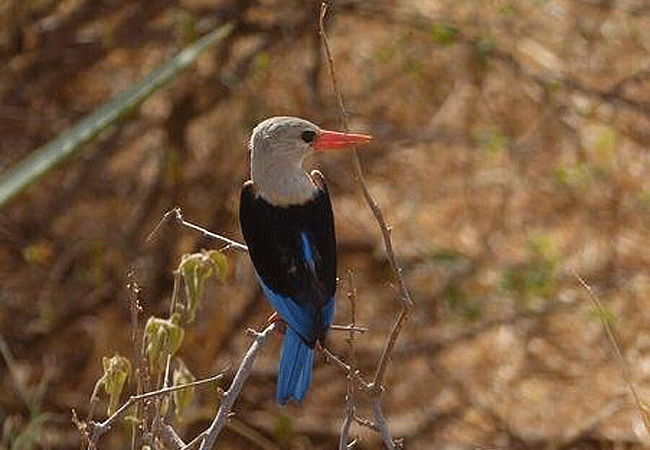
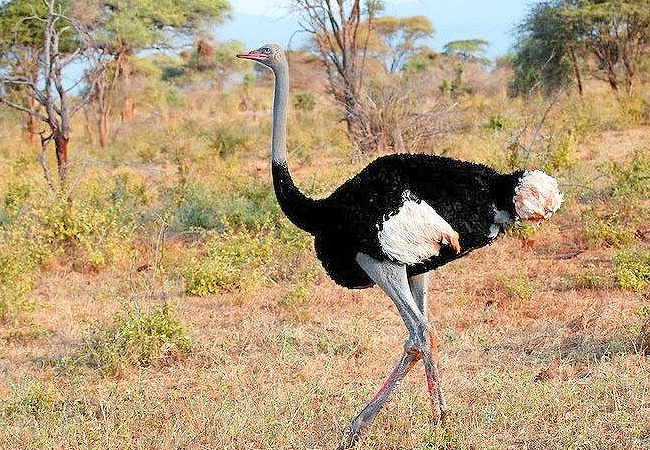
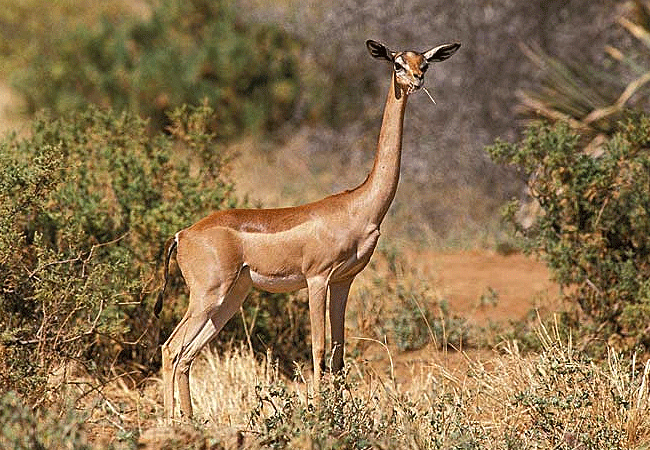
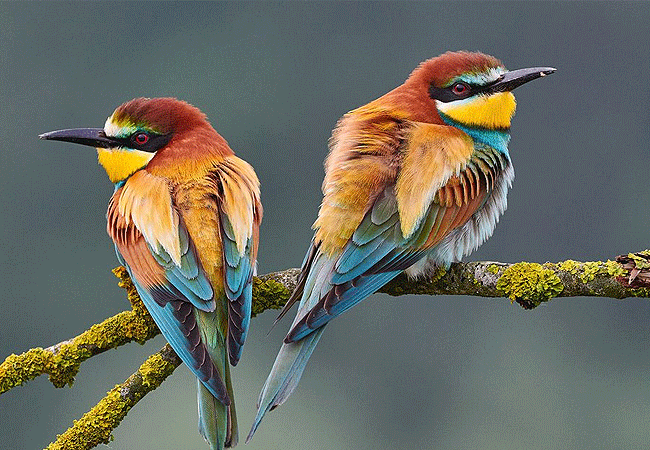
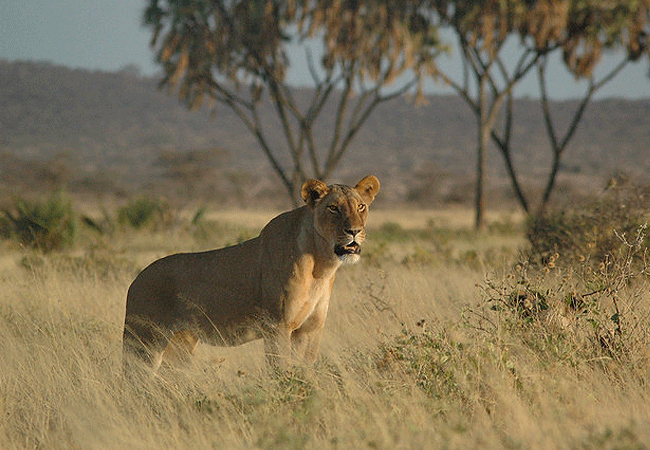
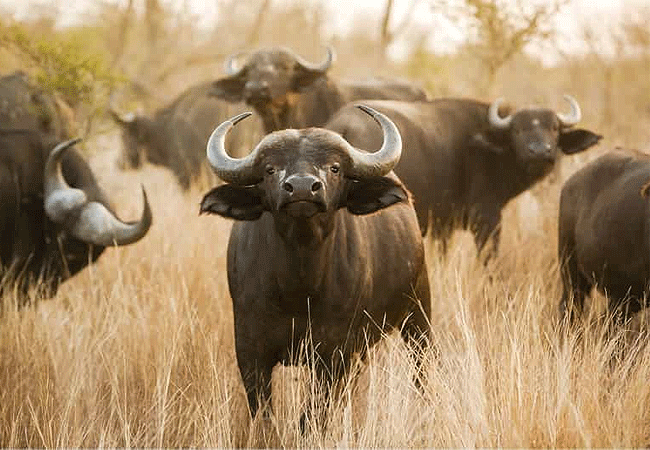
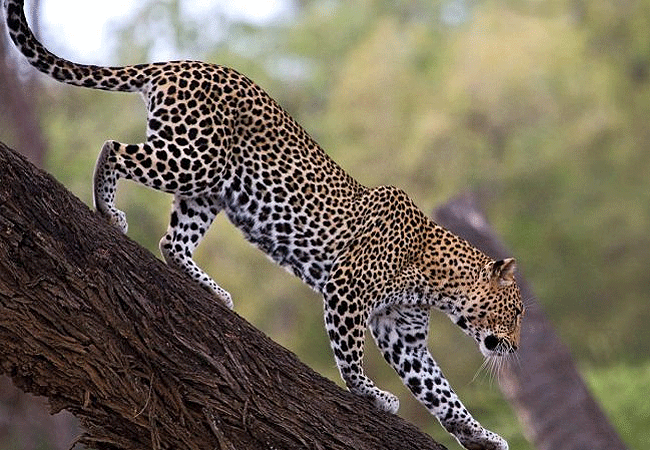
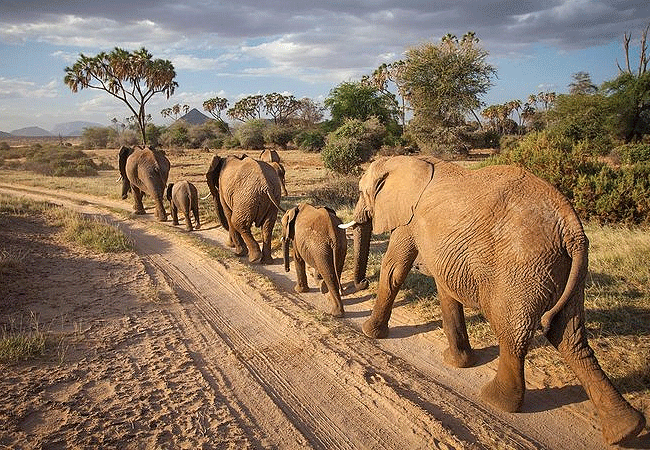
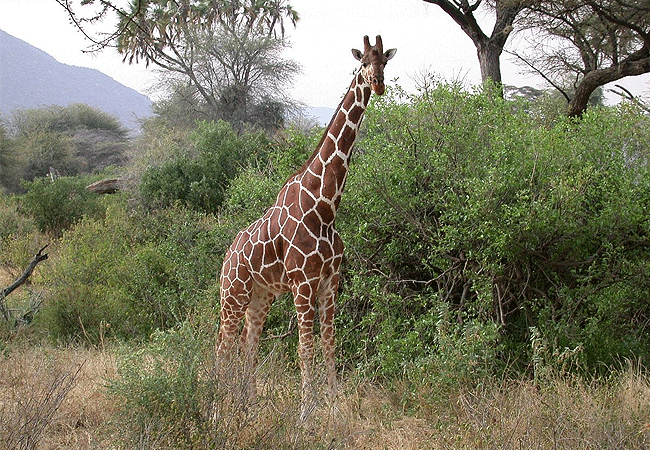
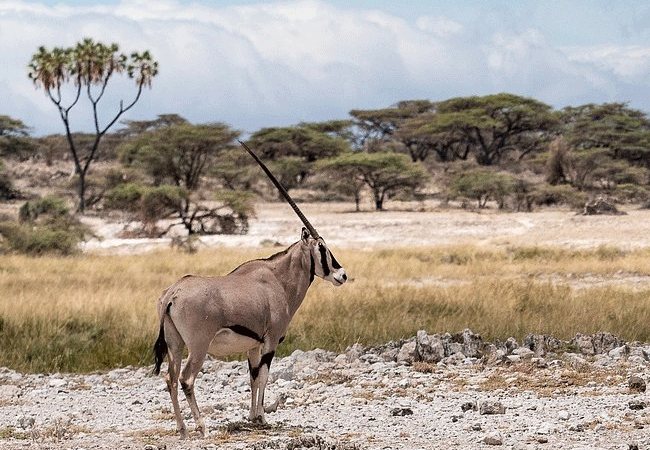
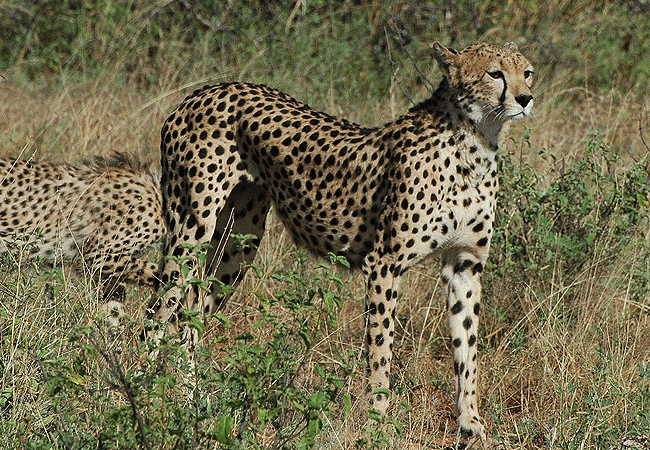
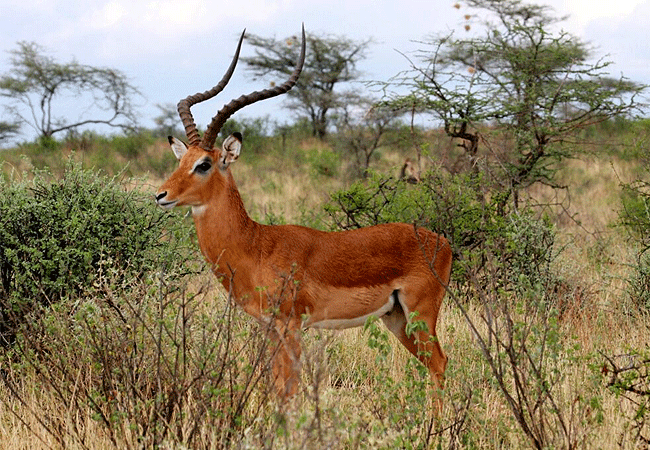
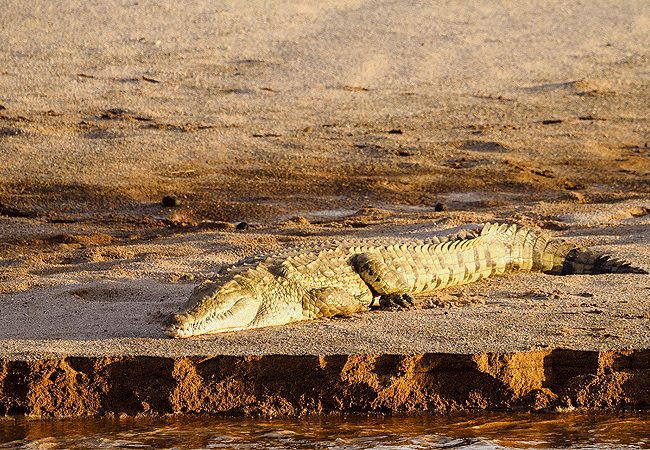
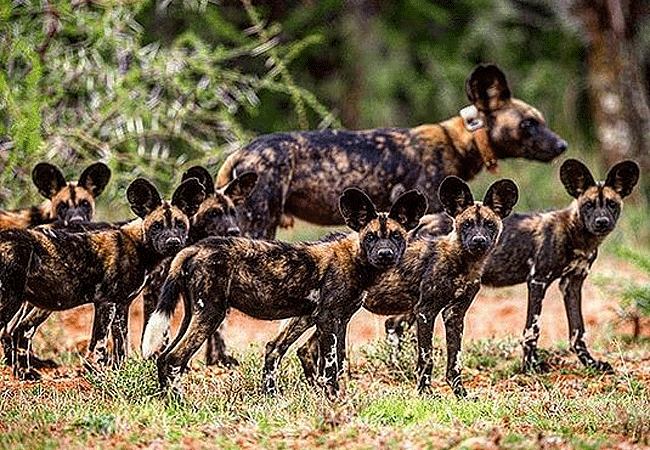
Shaba National Reserve Activities
Nature Walk
Nature walks in Shaba National Reserve offer an immersive experience in the unique semi-arid landscape. Accompanied by an experienced guide, visitors slowly explore the diverse flora and fauna, which provides opportunities to learn about the ecosystem, observe smaller animals and bird species, and take in the serene environment. The reserve’s volcanic terrain, dotted with springs, creates a picturesque setting for such walks.
Crocodile Watching
Shaba is known for its crocodile populations, especially along the Ewaso Ng’iro River, which borders the reserve. Crocodile watching typically takes place at strategic river viewpoints where these reptiles bask on the banks or glide through the waters. It’s a thrilling experience, as you witness these ancient creatures in their natural habitat. The guides share fascinating insights into the behavior and biology of crocodiles during this activity.
Game Drives
Game drives are a primary way to explore Shaba National Reserve’s wildlife. The reserve is home to an array of wildlife, including lions, elephants, giraffes, zebras, and the rare Grevy’s zebra. Early morning and evening drives offer the best opportunities for sightings. The landscape, with its volcanic hills and springs, enhances the experience, providing a contrast to more traditional safari environments.
Climbing
The rocky and hilly terrain of Shaba National Reserve is ideal for climbing enthusiasts. The volcanic formations within the reserve offer climbing opportunities that range from easy treks to more challenging routes for experienced climbers. While the activity may not be as common as game drives, it’s a rewarding way to experience the reserve’s geological features and enjoy panoramic views from elevated points.
Traditional Samburu Village Visits
Shaba National Reserve is near the Samburu community. A visit to a traditional Samburu village offers insight into the rich culture, traditions, and daily life of this pastoralist group. Visitors can engage with the Samburu people, observe traditional dances, and learn about their way of life, including livestock herding, beadwork, and their deep connection to the land.
Camel Safaris
Camel safaris offer a unique way to explore the reserve. Guided by local experts, visitors traverse the landscape on camels, reminiscent of ancient nomadic traditions. This slow-paced journey allows for an intimate connection with the surroundings, and camels can access areas that might be difficult to reach by vehicle. Camel safaris provide a peaceful and eco-friendly alternative to game drives, allowing for close wildlife observations.
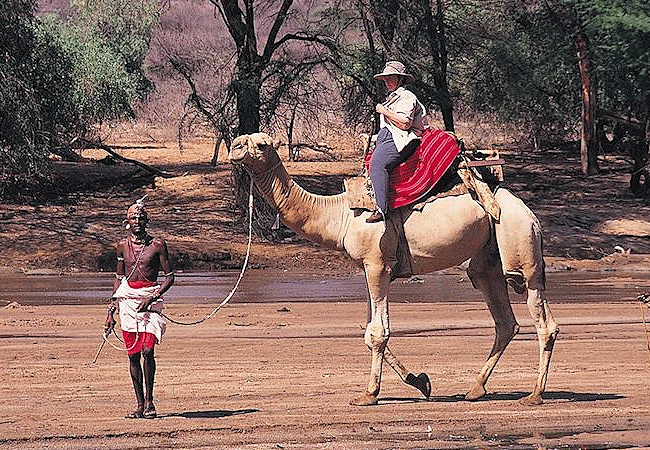
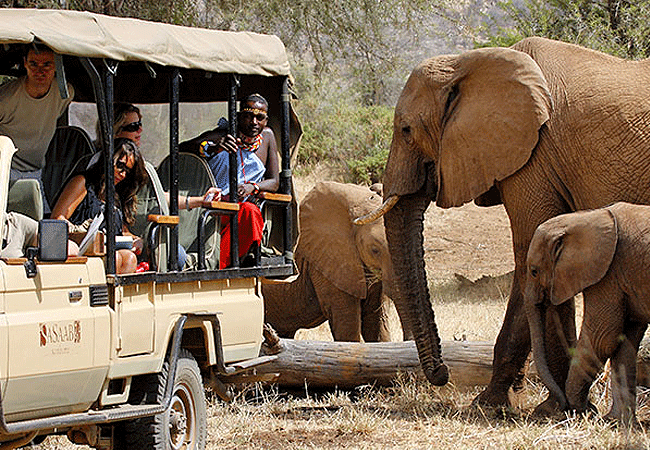
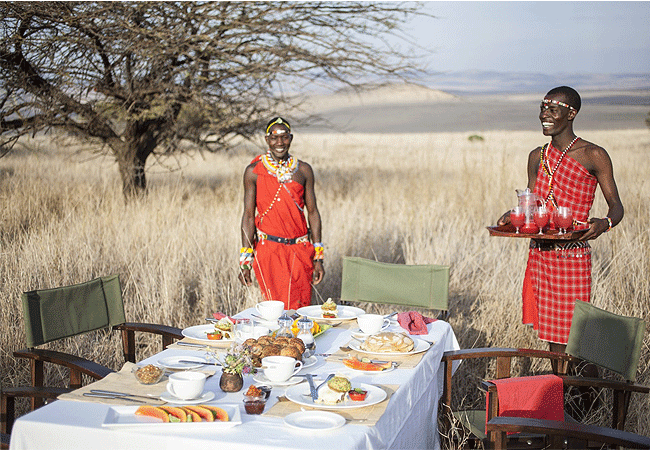
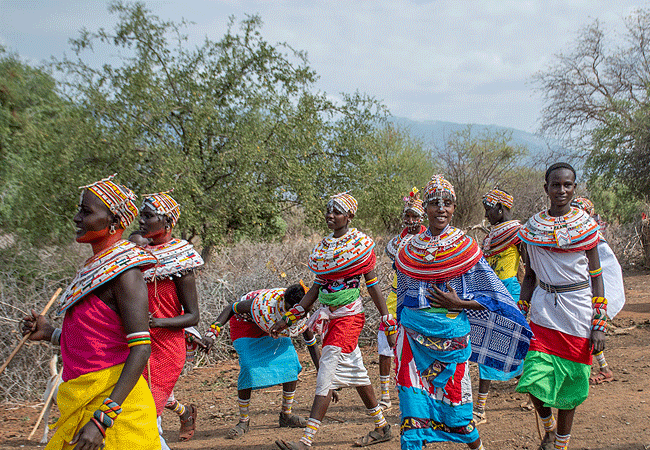
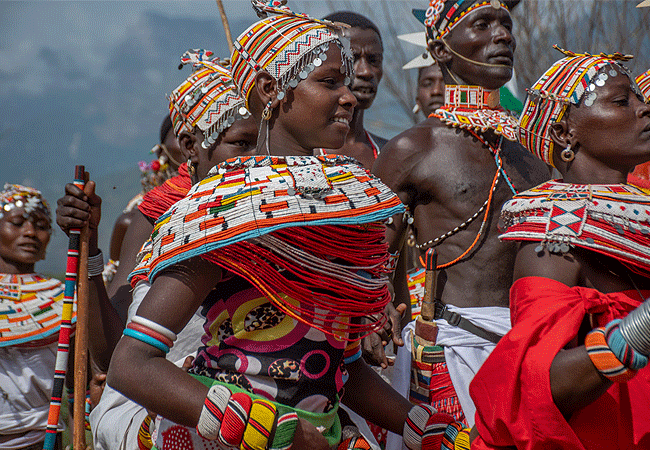
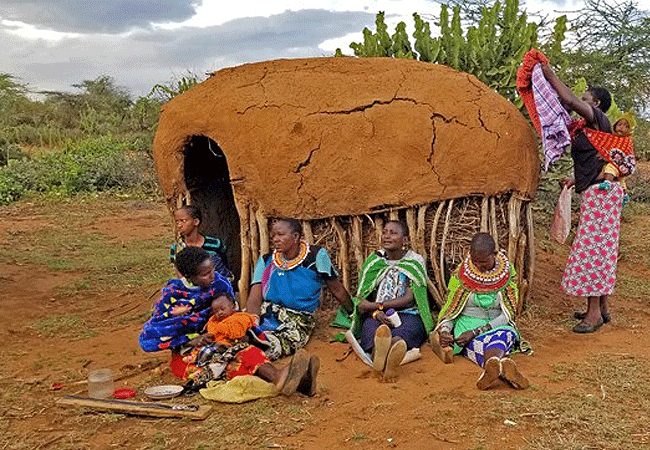
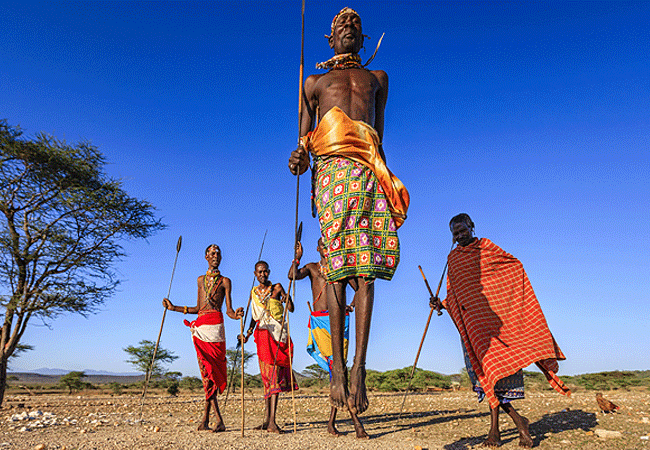
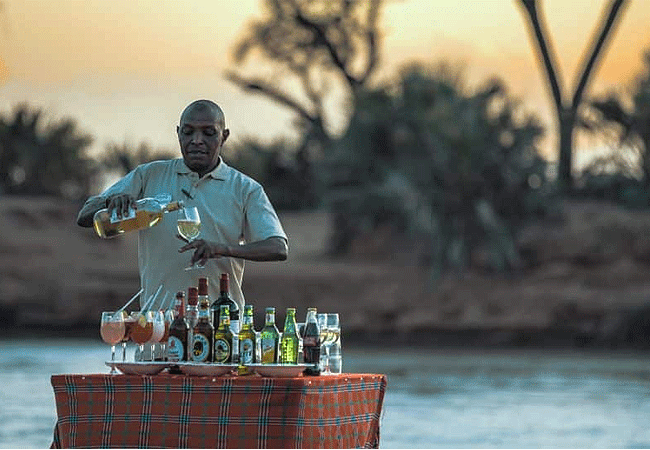
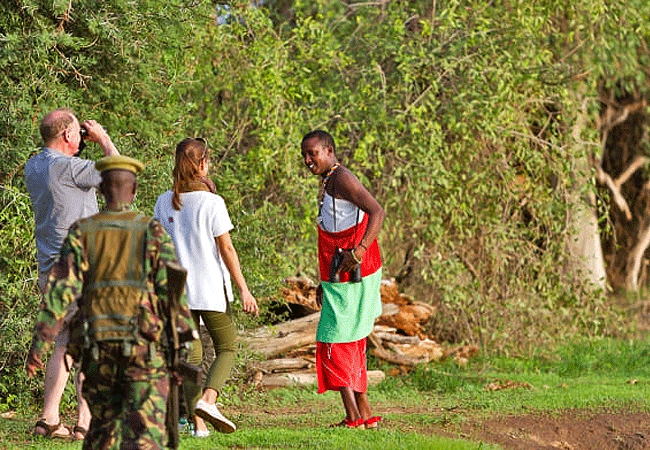
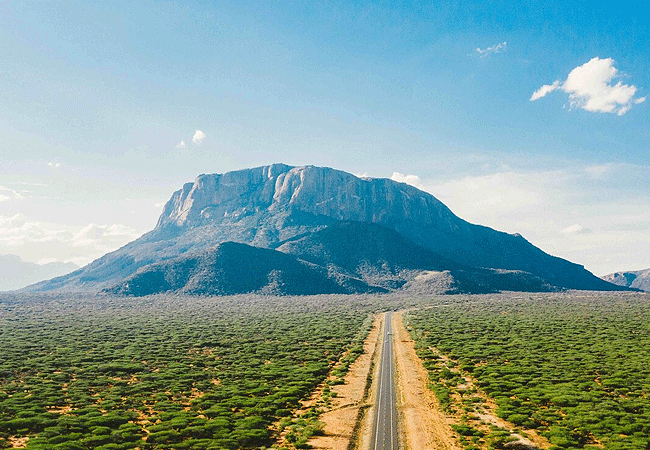
Entrance Fee to Shaba National Reserve
2025 Shaba National Reserve Entrance Fees |
||
Citizen/ Resident Rate Per Person Per Day |
Non-Resident Rate Per Person Per Day |
|
| Adult | 1000 Kenya Shillings | 80 US Dollars |
| Child | 500 Kenya Shillings | 40 US Dollars |
Notes
* Child refers to persons from three years buFt below 11 years
* Resident refers to persons of other nationalities residing in Kenya with valid documentation from the Kenyan government
* Citizen – A native or inhabitant of East African countries (Kenya, Uganda, Tanzania, Rwanda, Burundi, and South Sudan) with valid identification documents or passport
* Daily – Fee paid for a single entry to a national park, national reserve, or sanctuary and which shall be valid for no longer than twenty-four hours
Shaba National Reserve Accommodation
Sarova Shaba Game Lodge
Sarova Shaba Game Lodge is a 4-star safari accommodation located in Shaba National Reserve, east of Samburu, along the bank of the Ewaso Nyiro River. It is also the only accommodation option available in the Shaba National Reserve. Sarova Shaba Game Lodge is situated in a natural oasis in Shaba National Reserve and offers complete serenity amidst wild and beautiful surroundings. It is a unique safari experience that will fill all your senses with the sights and sounds of nature.
The Lodge has 80 standard (chalet-style) rooms, 4 Executive Suites, and 1 Presidential Suite. The standard rooms are lavishly fitted with mosquito nets, minibars, tea/coffee-making facilities, overhead fans, en-suite bathrooms with permanent showers and flush toilets, and private balconies with clear views of the river and game park.
All meals are served “al fresco” at the Surpelei Restaurant, which is raised on stilts, offering breathtaking views of the lush gardens and the Ewaso Nyiro River. The restaurant features elaborate buffet counters and live cooking stations, serving Pan-African, Pan-European, and Pan-Asian cuisine. Click Here for more details.
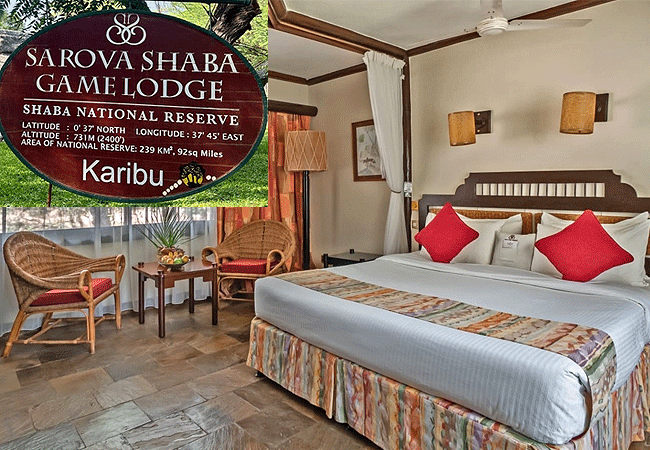
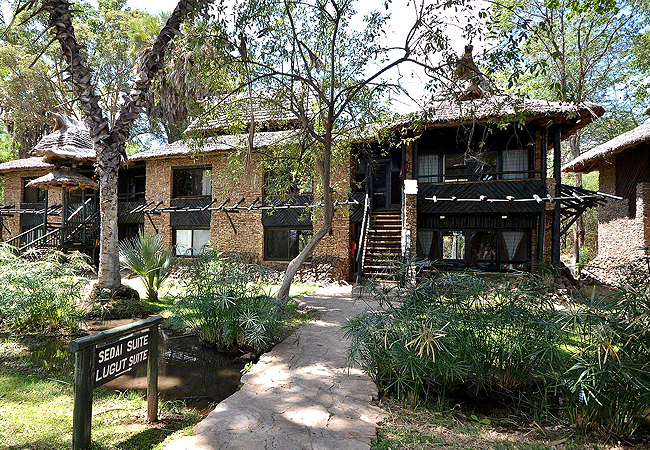
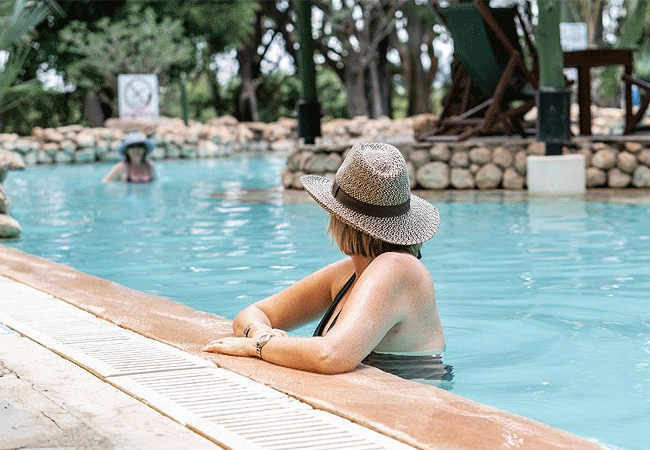
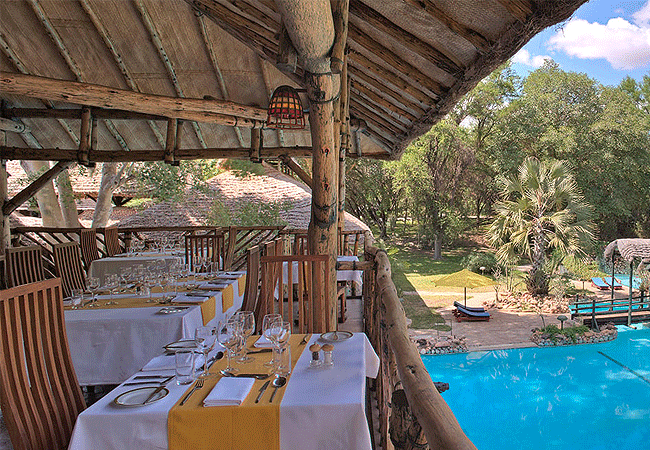
Booking & Reservations Shaba National Reserve Contact
Mobile: + 254-721-242-711
WhatsApp: +254-721-242-711
Reservations: +254 718-179-967
Email: [email protected]
Website: https://africanspicesafaris.com
